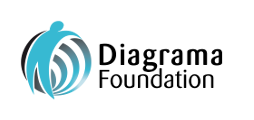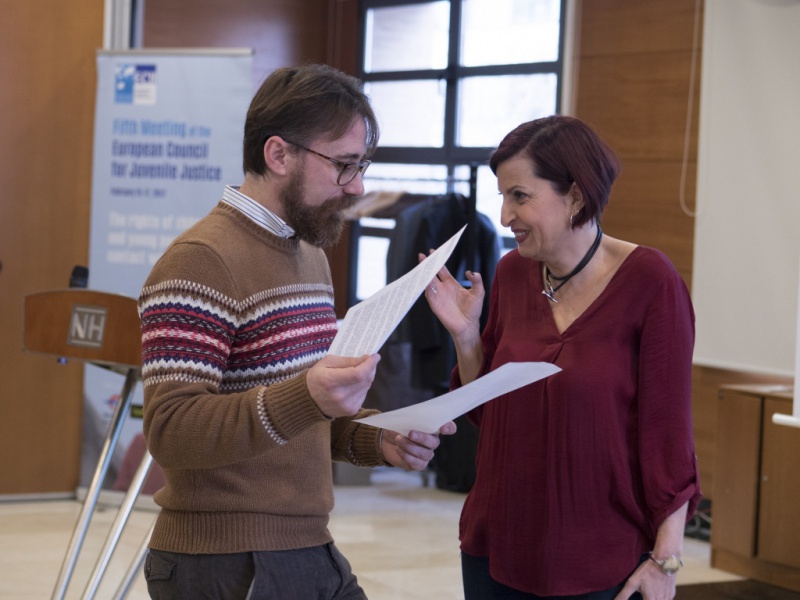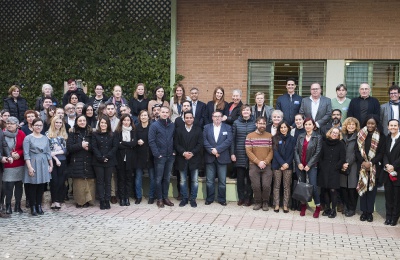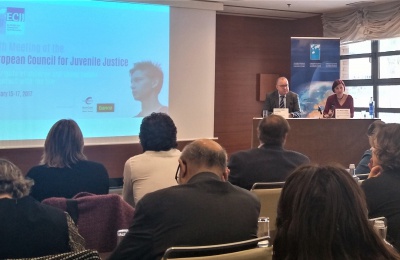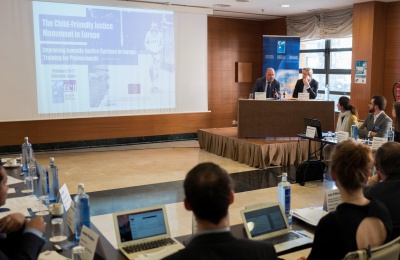From February 15 to 17, Diagrama Foundation was represented by its CEO, David McGuire, at the Fifth meeting of the European Council for Juvenile Justice (ECJJ), celebrated at Hotel NH Las Artes, in Valencia, which gathered more than 60 experts in this field from different European countries. The event, organized by the International Juvenile Justice Observatory (IJJO), and supported by IberCaja Obra Socil and Bankia, was aimed at providing a space of debate in order to tackle the different issues faced by the juvenile justice systems in Europe when it comes to protect and guarantee the rights of children and young people in conflict with the law or at risk of social exclusion.
The ECJJ meeting was officially introduced by the IJJO Chairman, Francisco Legaz Cervantes, and Rosa Molero Mañes, Director General for Children and Adolescents of the Autonomous Government of Valencia, before a plenary session tackling child-friendly justice priorities for 2017-2019 in Europe, presented by Valentina Boz (HELP Programme, COE) and Anna Markina (Tartu University, Estonia).
One of the main focuses of the meeting was the discussion of the effective implementation during this period in EU Member States of the recently adopted Directive 2016/800/EU on procedural safeguards for children accused or suspected in criminal proceedings. Libby McVeigh (Fair Trials International), and Ton Liefaard with Stephanie Rap (Leiden University) gave presentations on child-friendly justice in the framework of this new Directive.
Leading on from this, the two academics from Leiden University requested ECJJ members to participate in a group dynamic to produce input on this subject, which shall be released as a white paper focusing on the Directive.
Following a morning of presentations, a field visit to the Pi Gros youth detention centre in the province of Castellón was organised. The field visit allowed participants to observe an example of good practices being put into practice in the context of a juvenile detention centre, in accordance with the recommendations of the IJJO project 'Improving'. These include the application of European and international standards, as well as best practices, regarding subjects such as effective participation of children, their right to information, communication skills of the staff with the child, the role of parents during pre- and post-trial detention, among others.
The final day of the meeting was a working groups dynamic, as members worked together on four specific subjects in research and advocacy.
Firstly, the working groups were introduced by relevant esteemed professionals, during which an overview of the subject was offered. Jerzy Sarnecki (Stockholm University) introduced the group on all forms of detention and alternatives, while Neven Ricijas (University of Zagreb) opened the group on restorative approaches, Jolande uit Beijerse (Erasmus University Rotterdam) the group on procedural safeguards and child friendly justice, and finally Annette Storgaard (University of Aarhus) introduced the group on countering violent extremism.
Following these introductions, participants were split into the four working groups and simultaneously allowed time to hold a group meeting. Participants were able to work through the relevant issues with lively debate as a result of the diverse international backgrounds of the professionals in attendance. The working groups then came together, with rapporteurs from each group offering a short overview of their meeting, as well as the conclusions and observations reached.
